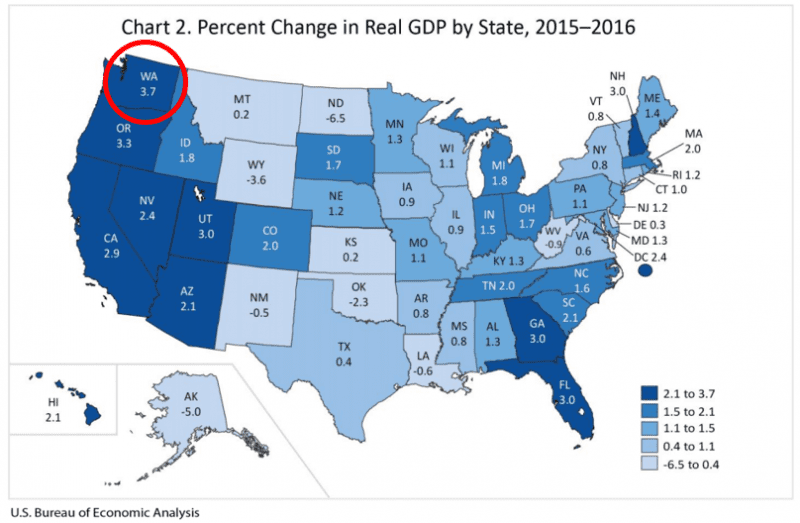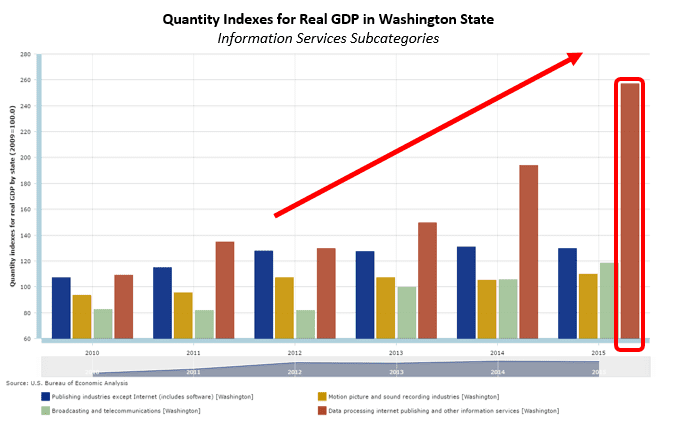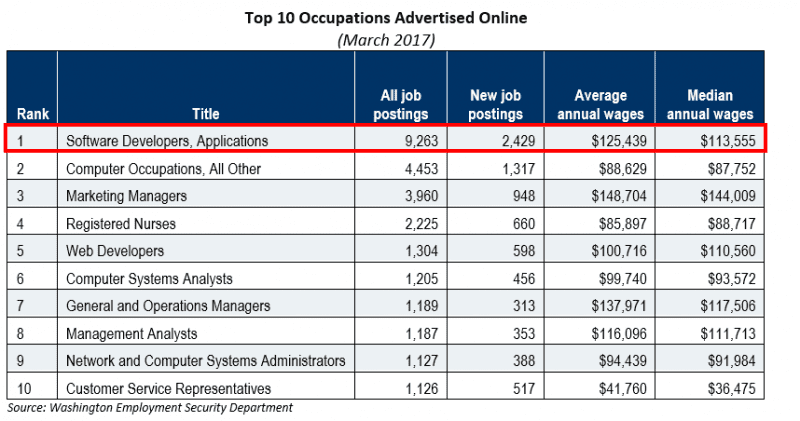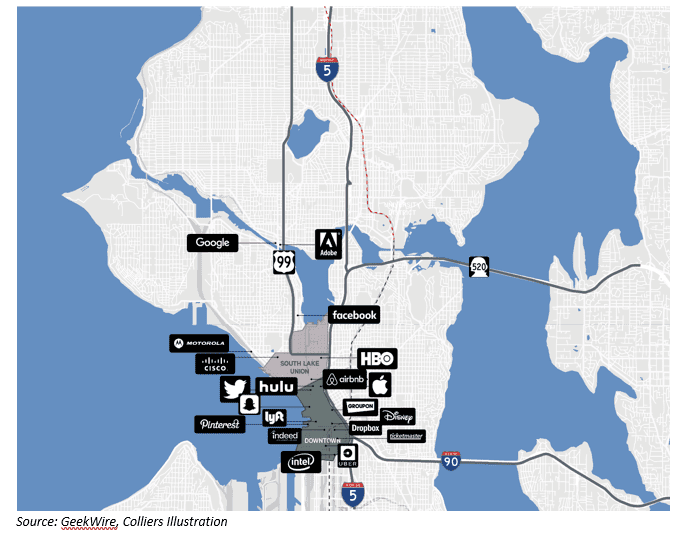National news got you down? Worry not! While the U.S. GDP languishes – only growing by 0.7% in the first quarter – the Puget Sound region and Washington state are recording phenomenal economic growth metrics.
Why does Gross Domestic Product (GDP) matter? Production is directly related to demand, and growing (or expansion) of demand puts more money in everyone’s pocket. More promotions at Amazon mean additional and more expensive trips to retail and restaurants, which means bigger tips for baristas and bartenders – and everyone having more money for rent!
Seattle and Washington’s Robust Performance
A recent report from the Bureau of Economic Analysis (BEA) revealed that Washington State led the nation for real GDP growth in 2016, growing an impressive 3.7%. While GDP can be a misleading indicator of economic success, it’s still a useful benchmark for tracking our region’s growth versus the rest of the country.

These results affirm our prognostications and pronouncements over the last several years: Washington – and, in turn, Seattle – is one of the strongest markets in the country. Companies here aren’t only hiring like crazy, but they’re putting rubber to the road and producing revenue. That revenue remains in our market, ending up in the pockets of retailers, restaurateurs, and apartment owners alike.
The Tech Sector Leads GDP Growth
The Information Services sector – which includes publishing, film studios, and software development under one category – was Washington state’s leading contributor to GDP growth in 2016. This is far from a surprise – companies like Apple, Facebook, and Uber continue rushing into the region to take advantage of our local tech talent.
When you dig into this sector’s GDP growth further, the story becomes even clearer:

That rapidly growing bar in the above graph? That subcategory covers software developers and computer programmers. These roles – and the companies that employ them in Seattle – are driving the Puget Sound region into the national spotlight.
The Demand: Tech Companies Can’t Hire Fast Enough
The tech flywheel effect that I’ve written about before (here and here) is getting stronger and stronger in Seattle. Tech talent begets tech talent, and some of the biggest tech companies in the world are eager to capitalize.
“Software developer” has been the no. 1 most frequent title in King County job postings for the past six months, and every month the number of new postings for the position hovers around 2,000! For job postings, 5 of the top 10 most frequently advertised jobs are for tech-related roles, which reveals the gap between the region’s supply and companies’ demand for these high-wage positions.

Beyond the well-known tech giants who opened headquarters in Seattle, many tech leaders are opening engineering centers in Seattle to capitalize on the talent. To date, more than 80 companies headquartered outside Seattle have opened satellite offices here:

The Supply: More Software Engineers Means more Apartments
This modern-day gold rush for talent – particularly software engineering talent – is great news for the office real estate market in Seattle. It’s even better news for multifamily investors, because this gold rush is full of renters.
Many of the people moving to Seattle for a job – regardless of their starting salary – are renting instead of facing the daunting housing market here. Most of these tech renters are young, have disposable income, and want to live in the city’s core where they can be close to work, restaurants, bars, and their friends. Additionally, they want to stay mobile as they change companies and get to know the city.
Seattle’s urban core is set to deliver nearly 55,000 units before the end of the decade, which may sound daunting. However, the bulk of these units are within walking distance of downtown Seattle, close to the headquarters of companies like Amazon, Google, and Facebook. If hiring and GDP keep pace in the next five years (and I think they will), 55,000 units may not sound so scary by the time we reach 2020!
The Rising Tech Tide Lifts Us All
Unfortunately, we can’t all be software engineers, and the city’s teachers, policemen, grocery clerks, and real estate brokers need places to work and live, too.
Luckily, Seattle’s tech boom isn’t happening in a vacuum. Job growth has increased across all of Seattle’s sectors over the past few years, and the gains in the retail and hospitality sectors indicate that tech employees’ high wages are trickling down through our economy.
In 2016, Washington state’s next biggest contributor to GDP growth last year was the Retail Trade sector, which includes the economic output of the Starbucks baristas, bookstore clerks, mechanics, and furniture sales people in our region. And guess what? They need apartments, too.
What is termed “the multiplier effect” amounts to a huge boon to Seattle and its apartment market. Several studies have shown that the creation of tech jobs leads to the creation of jobs in other sectors of the economy, too. One study reported that every job created in the tech sector created 4.3 jobs in other local good and services sectors. In Washington, that number jumps up to 7 local jobs created for every tech job. The injection of high wage jobs ripples positively through the economy, and Seattle’s growth over the past few years proves the theory.
Rapid growth is good for the city, but it can also prompt worry – are we in a bubble ready to burst? Will this tech boom crash? Most people think of young, scrappy startups or the characters from Silicon Valley when they think of the tech industry.
Seattle’s tech scene is much more mature. Companies like Amazon and Microsoft have been around for decades, and their recurring revenue models (Amazon Web Services and the Microsoft Exchange Server, respectively) create a stronger foundation for our tech scene than in other markets.
The Seattle market is poised for a lot more growth on the horizon. We’re on pace to add more jobs than we did in 2016, and the concentration of tech talent here will only intensify. The implications for the apartment market are promising, with rising demand and an increasing median salary among renters.
Staying current and engaged in this market matters more than ever. Stay tuned to this newsletter and our site for more news, discussions, and expertise on Seattle’s market. Most importantly, pick up the phone and call us (or shoot us an email) with any questions about the market. We’re ready to Turn Our Expertise into your Profit!

